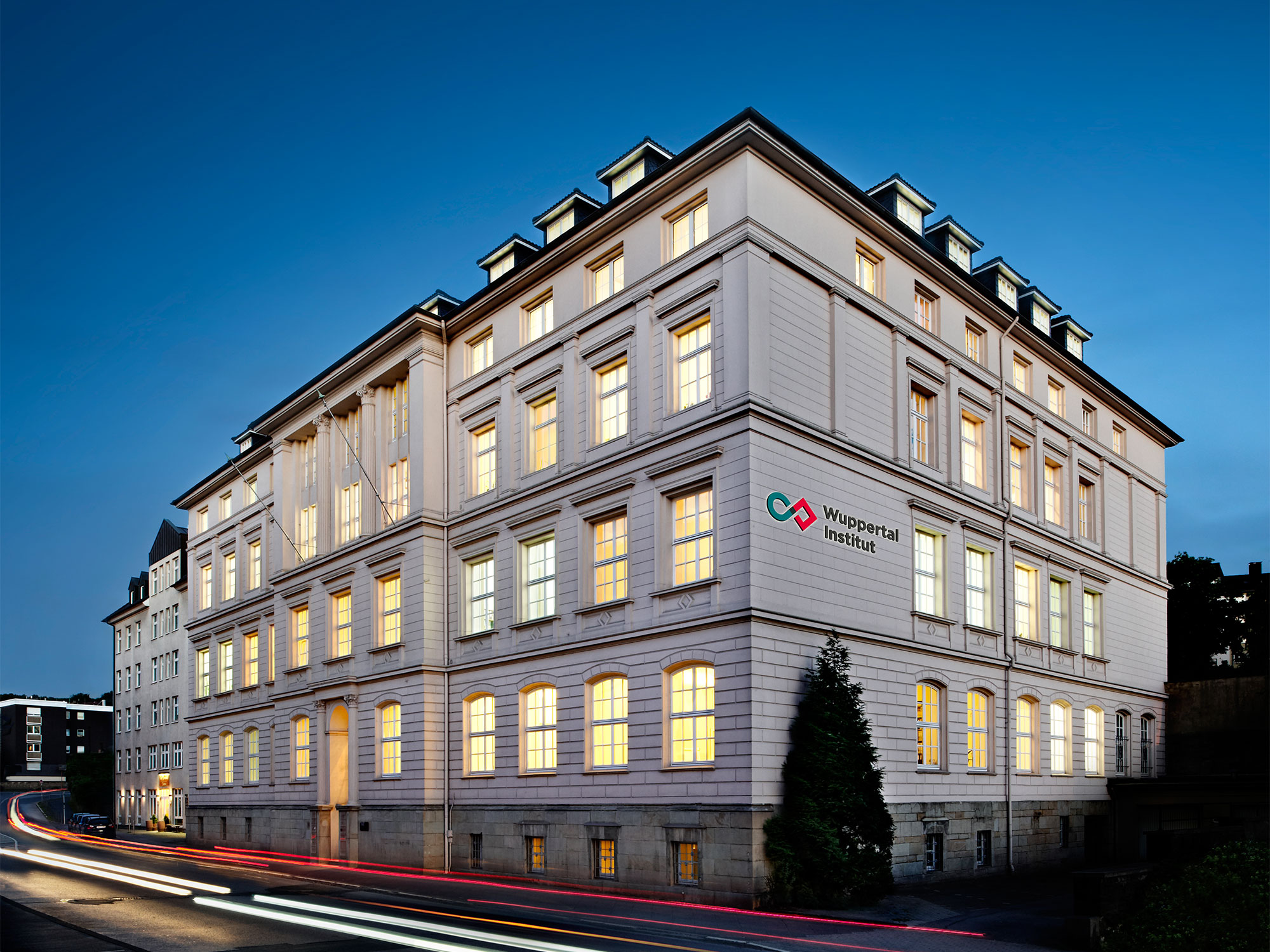The Institute
Mission of theWuppertal Institute
The Wuppertal Institute is a leading think tank for sustainability and transformation research focused on impact and practical application. The organisation's activities are centred on developing transformation processes aimed at shaping a climate-friendly and resource-efficient world.
The overriding goal of the Institute's work is to help to respect the planetary boundaries. This is represented in the guiding vision of a "climate-neutral and resource light society" by 2050.
The following are key characteristics of the Institute's research.
Interdisciplinary and transdisciplinary
Building on the foundations of traditional scientific work, focused on individual disciplines, an interdisciplinary approach is taken to addressing sustainability problems. The Institute pursues science on a transdisciplinary basis: rather than being merely an observer, the scientific community plays an active part in the transformation processes. Transformative research (transition research) and work in real-world laboratories constitute the Institute's conceptual framework.
Stakeholder-oriented
The Wuppertal Institute's research projects focus on the stakeholders who are actively involved on the ground and are usually conducted in close cooperation with them. The Institute sees itself as an intermediary between the worlds of science, industry and politics. Therefore, it takes the future application of its research into consideration in order to ensure that the findings are of great practical benefit to decision makers.
Innovative
All of the Institute's research projects are highly innovative. Its work is also concerned with analysing the effectiveness of innovations in regards to achieving the climate protection and resource efficiency goals. Innovations that facilitate systemic advances (next-level innovation) are of particular interest. They would appear to be essential to achieving the core Sustainable Development Goals in good time; however, they are often associated with intentional and sometimes unintentional structural changes.
Integrative
The research carried out by the Wuppertal Institute is integrative in many respects. On the one hand, it takes a holistic approach by interlinking climate, energy and resource objectives. Economic and institutional considerations are combined with cultural and social concerns. On the other hand, the Institute's activities are multiscale, meaning that it performs analyses at micro (local level, individual businesses, households), meso (regional level, industries and associations) and macro levels (national, European and global analyses).

This comprehensive, integrative approach is characteristic of the Wuppertal Institute's identity as well as being its USP when it comes to sustainability research. This concept of integration has five core dimensions that play a defining role for the Institute and its work and have been consistently developed in terms of content and methodology in recent years:
- Integrating core transformation arenas for sustainable development
In order to achieve the Sustainable Development Goals, very significant changes are needed in some areas ("transitions"). The Wuppertal Institute researches the challenges of transformation in the core arenas and looks in particular at the interplay between them. Its work is primarily focused on analysing the possible ways of designing the transition of energy, transport and industrial systems as well as the urban transition. For this purpose, the Institute has developed system models that facilitate greater understanding of cross-sectoral change processes.
- Zukunftskunst – integrating various aspects of the way transformation processes are designed
Transformation processes in favour of sustainable development emerge through a multifaceted interplay between technological innovations, economic conditions, institutional and political governance and cultural embedding. The latter expressly encompasses the social aspect and thus also questions of social acceptance and involvement/participation. This interplay is key to the successful design of transformation processes. The Wuppertal Institute has termed this interplay "Zukunftskunst" (future literacy) and has established a high degree of interdisciplinary expertise in its work, allowing it to reflect all the relevant aspects in the areas covered by its research.
- Future knowledge – integrating different forms of knowledge
In line with the concept of the transition cycle, research into and participation in the development of societal change processes by policymakers, civil society and business are dependent on three forms of knowledge: system knowledge, target knowledge and transformation knowledge. The Wuppertal Institute – together with partners from the worlds of science and industry – generates knowledge in all three areas and refers to the interplay between the three forms of knowledge as "future knowledge" (Zukunftswissen). The Institute therefore sees itself as a pioneer in the ongoing development of the methodology used in transdisciplinary and transformative research of this kind. Consequently, the Institute has played a decisive role in shaping concepts including "transformative science" and "real-world laboratories" in recent years.
- Multilevel governance – integrating stakeholders and stakeholder levels
Change processes in favour of sustainable development also require particular attention at governance level. This includes local, regional, national and international levels, because change processes generally necessitate interaction between all levels and stakeholders, from the transition in the energy and transport systems through to shifts in consumption patterns. Through its transdisciplinary research, the Wuppertal Institute therefore cooperates closely with stakeholders at all these levels and both incorporates and interlinks their perspectives and scope for action. It is only by taking this multilevel approach to governance that ideas for integrative solutions can be developed with due consideration for synergy potential as well as areas of conflict between the various levels.
- Integrating and exchanging expertise and experience
As one of the world's major urban and industrial metropolitan areas, the German state of North Rhine-Westphalia (NRW) faces particular transformational challenges. Experience in the development of successful transformation strategies is thus highly relevant to the sustainability debate at international level. The Wuppertal Institute works closely with the NRW state government on this subject – on the one hand actively assisting in the development of potential solutions and, on the other, compiling empirical knowledge. In this respect, the structural change brought about by the transformation processes is particularly important, as are the possibilities of providing proactive support. As an international think tank, the Wuppertal Institute draws upon the implementation experience gained in other regions of the world and analyses the extent to which this experience can be transferred to NRW.
